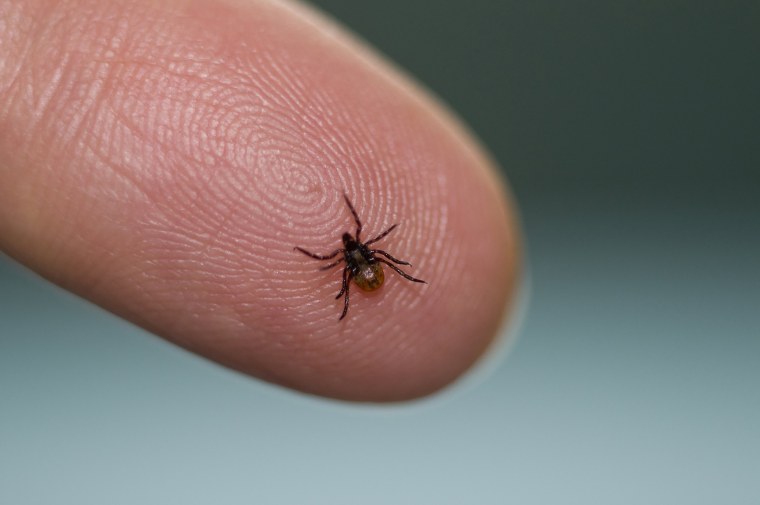With Lyme disease on the rise, why do so many chronic sufferers struggle to convince doctors they're sick?
by Jordan Rosenfeld / Jun.16.2018 / Updated Jun.16.2018
It's not uncommon for people with suspected or persistent Lyme disease to meet with doubt from the medical establishment. But that may be changing.

Lyme disease is caused by a spiral-shaped bacteria found in the saliva of the blacklegged tick.andriano_cz / Getty Images/iStockphoto
New York-based writer Porochista Khakpour has spent 12 years seeking answers to a variety of strange physical symptoms that have baffled doctors, from convulsions and tremors that feel like a panic attack, to debilitating fatigue. She’s sought midnight answers for strange fevers and painful gastritis, spent hundreds of sleepless nights fighting with drug-resistant insomnia, experienced rapid weight loss or gains of up to 40 pounds without any changes in diet, and most frightening to her, difficulty swallowing.
The author of two novels and the new memoir, “Sick,” Khakpour has visited dozens of doctors in some of the most respected medical institutions around the country. For years, these often-debilitating symptoms were written off as psychological or psychosomatic. It wasn’t until 2012 that multiple, expensive blood tests from a company called IGeneX confirmed the presence of Lyme disease in her blood, caused by the bite of an infected tick. “I’m one of the rare cases where you have an unequivocal diagnosis. People have put that at less than 10 percent,” Khakpour tells me.
Numerous patients say they live with chronic, persistent symptoms, like Khakpour, who experiences what she calls “Lyme relapses.”
Lyme disease is caused by a spiral-shaped bacteria (a spirochete) called Borelia burgdorferi, found in the saliva of the blacklegged tick, often called a deer tick. The bacteria proliferates rapidly and has adapted complex survival mechanisms. Though most physicians believe it can be eradicated with a round of antibiotics, the bacteria has been shown to return after treatment in the blood and tissue of animals and humans. And numerous patients say they live with chronic, persistent symptoms, like Khakpour, who experiences what she calls “Lyme relapses.”
Khakpour is also among the fewer than 50 percent of people with Lyme who do not remember being bitten by a tick and who did not spot the famed “bulls-eye” rash that is typically an indicator of the disease. This could be for a variety of reasons: Khakpour says one of her doctors believes she may have been first been bitten as a child. It is also possible to become re-infected, which can worsen symptoms or cause them to recur after the initial treatment.
While frustrating, Khakpour’s long journey to a Lyme diagnosis is not unique. Due to Lyme’s complex presentation, slow-growing body of research in the United States and an inconsistency in the quality of blood tests, it’s not uncommon for people with suspected or persistent Lyme disease to meet with doubt from the medical establishment. There is a lot of debate among physicians as to whether chronic or persistent Lyme disease is even real. As Khakpour writes in “Sick,” “[Lyme is] thought of as the disease of hypochondriacs and alarmists and rich people who have the money and time to go chasing the diagnosis.”
Iit’s not uncommon for people with suspected or persistent Lyme disease to meet with doubt from the medical establishment.
But Khakpour is also part of a growing movement of people trying to change this perception. Marina Makous, a family medicine doctor in Exton, Pennsylvania, and a former fellow at the Neuroinflammatory Diseases Center at Columbia University’s Lyme and Tick-borne Diseases Research Center, is among a small though growing group of physicians with expertise in Lyme and related diseases.
She says that many of her patients have seen anywhere from 25 to 40 doctors without a successful diagnosis before they come to her. “It's very serious. I think there is an under appreciation of the seriousness of this illness, especially when [physicians] don't treat patients with Lyme disease on a daily basis.”
Part of the problem is that Lyme “is the great imitator,” Makous says. “It’s a multi-systemic disease. There aren’t specific symptoms unique only to Lyme. It can look like stroke, like Alzheimer’s, like vascultis, like neuropathy.” She cites the example of musician Kris Kristofferson, who was first misdiagnosed with Alzheimer’s. When he was eventually correctly diagnosed and treated for Lyme, his symptoms improved.

The culprit.Lauree Feldman / Getty Images
Even more complicated, Makous says, is that sometimes when a patient with Lyme is treated with an initial round of antibiotics, the treatment “may blunt the development of antibodies.” So future tests for Lyme turn up negative, but really the bacteria lingers, wreaking havoc on the body.
Another difficulty in diagnosing Lyme is that it often presents with psychiatric symptoms, something Khakpour continues to battle. She believes this was part of what kept doctors from diagnosing her. Raised to trust doctors without question by her Iranian immigrant parents, she was at a loss. “But that didn't explain to me why I would have fever, or why my body would be in convulsions, why I would develop these huge allergies. Then they'd say, ‘Well, the mind is very strong you know.’"
Makous explains that it’s not the mind that is affected by Lyme, but the neurology. Lyme is notorious for causing neurological symptoms that can manifest in both psychiatric symptoms like depression and anxiety — Makous sees increased signs of suicidality in her Lyme patients — as well as facial weakness, headaches, sensory disturbances and cognitive problems.
Makous, who spends up to an hour every day combing through the newest research, believes the sheer “explosion” of the disease around the country will force more doctors to take the chronic, persistent nature of Lyme seriously.
Despite some physicians’ lingering doubt about the persistence of chronic Lyme disease in patients, it's clear that Lyme itself is increasing. The Centers for Disease Control (CDC) recently issued an updated warning that insect borne diseases, especially those spread by ticks, are on the rise, having more than doubled from 2004 to 2016.
“You can think of ticks as dirty needles,” Makous says. “They carry multiple pathogens and can transmit other things that make it more difficult for the immune system to fight off Lyme disease.”
While the medical establishment may still be slow to accept persistent Lyme disease, Makous, who spends up to an hour every day combing through the newest research, believes the sheer “explosion” of the disease around the country will force more doctors to take the chronic, persistent nature of Lyme seriously.
Khakpour, meanwhile, worries that she may never get truly better. Although she has periods of wellness, and even what seems like remission, she has resigned herself to living with the long-term repercussions of the illness. “It never seems to go away, the feeling that as much as I achieve or as strong as I can be, this disease is smarter.”
Jordan Rosenfeld is the author of seven books. Her work has appeared in The Atlantic, DAME, Quartz, New York Magazine, Scientific American and many more. Follow her @JordanRosenfeld.
https://www.nbcnews.com/think/opinion/lyme-disease-rise-why-do-so-many-chronic-sufferers-struggle-ncna883881

No comments:
Post a Comment
All comments welcome but advertising your own service or product will unfortunately result in your comment not being published.